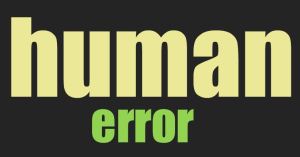- Do you make mistakes? –> Who doesn’t?
- How do you feel when you know you are wrong? –> I guess … not so great
- Do you like to admit that you were wrong? –> noooo way
- What will you do to avoid being wrong? We all know that people make mistakes but somehow when comes down to “us”…ok, when comes down to “me” (as individual) – I don’t want to make mistake.
-
I found on TEDtalk a video – Kathryn Schulz: On being wrong. Kathryn is a wrongologist and talks about human fallibility.
She wrote very interesting book “Being Wrong“:
To err is human. Yet most of us go through life tacitly assuming (and sometimes noisily insisting) that we are right about nearly everything, from the origins of the universe to how to load the dishwasher. If being wrong is so natural, why are we all so bad at imagining that our beliefs could be mistaken – and why do we typically react to our errors with surprise, denial, defensiveness and shame?
-
Here’s the video from TEDtalk:
-
Is there something wrong with us because we don’t like to admit that we are wrong? I don’t think so, according to Kathryn, we would like to insist that we are right because it makes us feel smart, responsible and SAFE. Of course I don’t want to admit that I’m wrong…it’s hard to do that but at the same time – I know I can make mistakes, and that’s the part of my life (my learning process).
-
I am really glad that Kathryn mentioned that – our capacity to screwed up is not a defect. It’s fundamental to who we are. That’s good to know, because we are making a lot of mistakes. ohh and one more thing – we learn the lesson (sometimes) after making mistakes. And as St. Augustine said: “Fallor ergo sum” = “I err therefore I am” – I only hope that every time I make a mistake I will learn the lesson.
Kathryn asked what does it mean to feel right? It means that your believes perfectly reflect reality. Well, for me it means that I feel gooood, because I’m not wrong.
3 unfortunate assumptions, according to Kathryn, what we do when someone disagree with us:
- The ignorance assumption –> we assume their are ignoramus
if that doesn’t work, even if they have the same facts as we do and they still disagree with us then …
- The idiocy assumtion –> we assume they are idiots
if that doesn’t work, even if they are pretty smart and have the same data as we then …
- The evil assumption –> those people disagree with us maliciously. They know the TRUTH and deliberately disagree
this attachment to our own rightness keep us from preventing mistakes when we absolutely need to and cause us to treat each other terribly.
The miracle of human mind isn’t that you can see world as it is and that you can see the world as it isn’t.
I have been wondering about that for a moment and after a while I thought “wow!” human mind is really cool thing ….just imagine 4 people looking at the sky by night, every each of them might see something different although all of them have been looking at the same sky. But they could see something like that:

if you really want to discover wonder you need to step outside that tiny terrified space of rightness. And look around at each other and look out at the vastness and complexity and mystery of the universe and be able to say “wow, I don’t know, maybe I’m wrong!”
-
…so next time when you look at something, think how others might see it








How much do I wrong? Let me count the ways. 1,000… 2,000… on and on.
The key thing is not to focus on the wrong. Its to focus on the lesson. If you don’t do wrong, you can’t learn.
Also… if you are comfortable in your own skin, you don’t fixate on the wrong. You fixate on the moving forward.. which includes many wrongs to do so.
Thanx for the great post Klaudia.
Thank you for the comment Laurinda,
I agree – focusing on those lessens is more important than just thinking “ohh I was wrong, I made a mistake”. Come on, we are making a lot of mistakes (ok. I don’t know about you people but I am making a lot of mistakes). It’s a great success if we are able to learn and not make the same mistakes again!